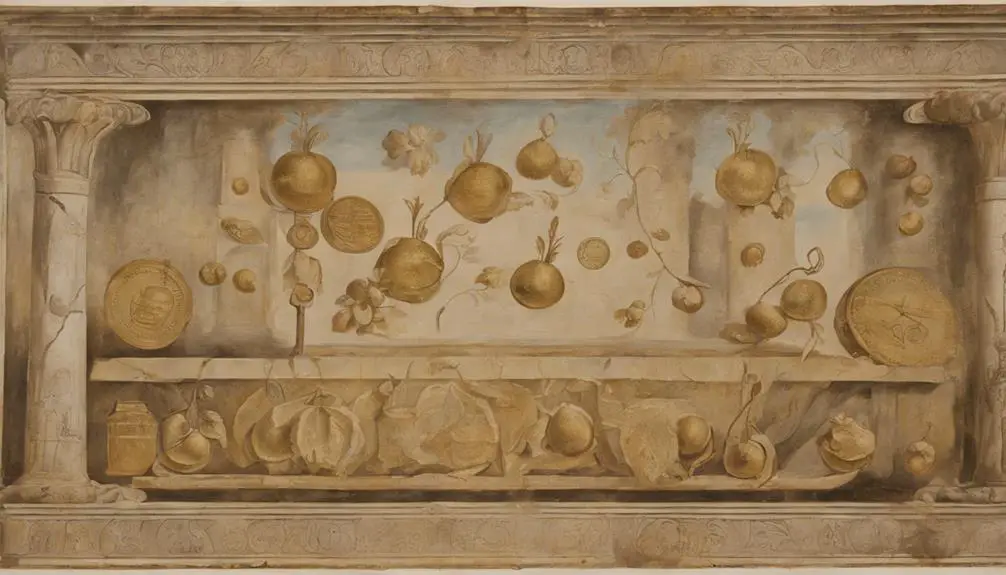Gain insights into the surprising frequency of money-related verses in the Bible, uncovering its profound financial wisdom.

How Many Verses in the Bible Talk About Money
Have you ever pondered how often the Bible discusses money?
It's more than you might think. Money, wealth, and the concept of possession penetrate numerous chapters and verses across both the Old and New Testaments.
From parables on generosity and wealth to admonishments against greed, the Bible's financial wisdom is vast and varied.
So, isn't it worth exploring just how deeply this theme is woven into the Biblical text?
Key Takeaways
- The Bible has numerous verses emphasizing responsible wealth management and generosity.
- Money in the Bible is often a tool for teaching spiritual lessons and moral virtues.
- Biblical teachings present a nuanced view of wealth, linking it to wisdom and righteousness.
- The Bible encourages generosity, especially towards the poor, and warns against the love of money.
Understanding Biblical Wealth

Delving into the scripture's teachings, you'll find that understanding Biblical wealth isn't solely about monetary riches, but instead focuses on spiritual abundance and stewardship. You'll observe that the Bible's notion of wealth extends beyond the confines of material possessions. It encompasses the richness of one's relationship with God, the depth of one's wisdom, and the extent of one's love and kindness towards others.
To elucidate, Proverbs 13:7 states, 'One person pretends to be rich yet has nothing; another pretends to be poor yet has great wealth.' Here, you find a dichotomy between worldly wealth and spiritual wealth, hinting at the deceptive nature of material riches. It's not about financial assets; it's about the wealth of character, morality, and spirituality.
Moreover, the Bible underscores the concept of stewardship. You're provided resources not for self-indulgence, but for responsible management and generosity. In 1 Timothy 6:17-19, the wealthy are advised not to hoard but to be generous, laying up treasure for themselves as a solid foundation for the coming age.
In essence, Biblical wealth is a multifaceted concept that transcends physical riches, prioritizing spiritual abundance and stewardship.
Poverty in Scripture

Shifting our focus to poverty, the Bible addresses this issue in a profound manner, challenging us to understand its implications and our responsibility towards those afflicted by it. Biblical texts often feature the poor prominently, underscoring the significance of poverty in the spiritual, ethical, and social narratives of scripture.
In Proverbs 14:21, it's declared, 'Whoever despises his neighbor is a sinner, but blessed is he who's generous to the poor.' Here, poverty isn't merely an economic condition; it's an ethical litmus test, gauging our moral fiber and compassion.
In the New Testament, Jesus' teachings often touch upon poverty. In Luke 6:20, Jesus proclaims, 'Blessed are you who are poor, for yours is the kingdom of God.' This verse suggests a profound spiritual dimension to poverty, affirming the inherent worth and dignity of the poor in God's eyes.
Thus, poverty isn't just socio-economic status in the Bible. It's a multifaceted concept with profound spiritual implications. Engaging with these verses, you're challenged to rethink poverty, not as a mere statistic, but as a crucial aspect of our shared human experience.
Generosity and Giving Verses

Examining the Bible's verses on generosity and giving, you'll uncover a rich tapestry of teachings that illuminate our understanding of wealth, urging us to give freely and live compassionately. The Bible's teachings on generosity aren't just passing comments, but rather profound statements that challenge us to reassess our attitudes towards wealth and possessions.
For instance, you'll find in Proverbs 11:24, a compelling paradox: 'One gives freely, yet grows all the richer.' This idea, counterintuitive in a materialistic society, speaks to the spiritual benefits of generosity. It suggests that the act of giving enriches us, not materially, but in ways that are deeper and more enduring. You'll encounter the same sentiment in 2 Corinthians 9:7 where it says, 'Each of you should give what you have decided in your heart to give, not reluctantly or under compulsion, for God loves a cheerful giver.'
These verses, and many others, emphasize that the value of giving isn't in the amount we give, but in the spirit with which we give. They invite us to see generosity not as an obligation, but as a joyous expression of our faith.
Parables Involving Money

Navigating through the pages of the Holy Scripture, you'll find numerous parables that use money as a metaphor, providing profound insights on its use and abuse, its potential for good and evil, and its role in our spiritual journey. For instance, the Parable of the Talents (Matthew 25:14-30) uses money to illustrate the importance of using God-given resources wisely and responsibly.
Conversely, the Parable of the Rich Fool (Luke 12:13-21) warns against hoarding wealth without being 'rich towards God'. These parables, amongst others, use monetary metaphors to promote virtues such as responsibility, wisdom, and spiritual richness.
Nevertheless, it's important to note that the Bible's parables about money aren't merely lessons about financial management. They're profound spiritual teachings, cloaked in everyday scenarios, challenging you to reflect on your attitudes towards wealth and material possessions. Money, in these parables, isn't an end unto itself but a tool that can either draw you nearer to or drive you further from the divine.
In essence, these parables serve as a reminder that while money has a place in our earthly lives, it mustn't overshadow our spiritual pursuits or distort our moral compass.
Wealth and Righteousness Connection

Often, the Bible draws a complex, nuanced connection between wealth and righteousness, challenging the simplistic notion that material prosperity is always indicative of divine favor. You'll find that the Bible doesn't categorically vilify wealth nor does it sanctify poverty. It's about the heart attitude towards wealth that's under scrutiny.
For instance, in Proverbs, wisdom and righteousness are often linked with prosperity, yet the same book warns against striving for wealth at the expense of integrity. Similarly, Jesus in the New Testament advises a rich young man to sell all he's to gain eternal life, but this isn't a universal command for believers. It's a pointed lesson about idolatry of wealth.
1 Timothy 6:10 highlights the potential pitfalls of wealth, saying, “For the love of money is a root of all kinds of evil.” Here, it's not the wealth itself that's problematic, but the attitude towards it. In contrast, Proverbs 10:22 asserts: “The blessing of the Lord brings wealth, without painful toil for it.”
Conclusion
You've explored the multifaceted approach to wealth in the Bible, from poverty to generosity, parables to righteousness.
The scripture doesn't shy away from discussing money, with over 2,000 verses addressing it directly or indirectly.
Remember, the Bible's perspective isn't about accumulating wealth, but understanding its potential and consequences. It encourages generosity and warns against greed.
So, let's carry these lessons into our daily lives, emphasizing compassion and care over materialistic pursuits.



Sign up